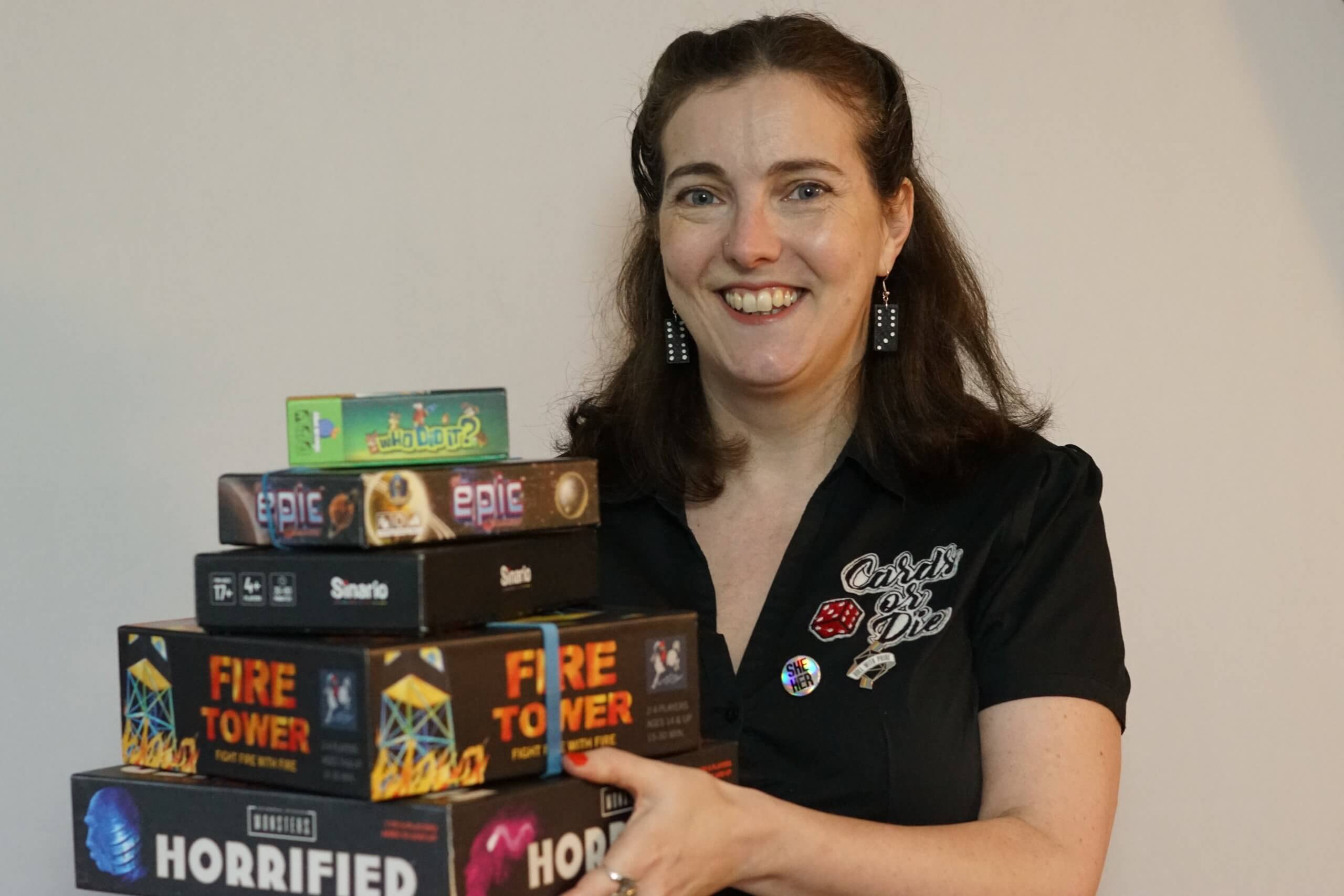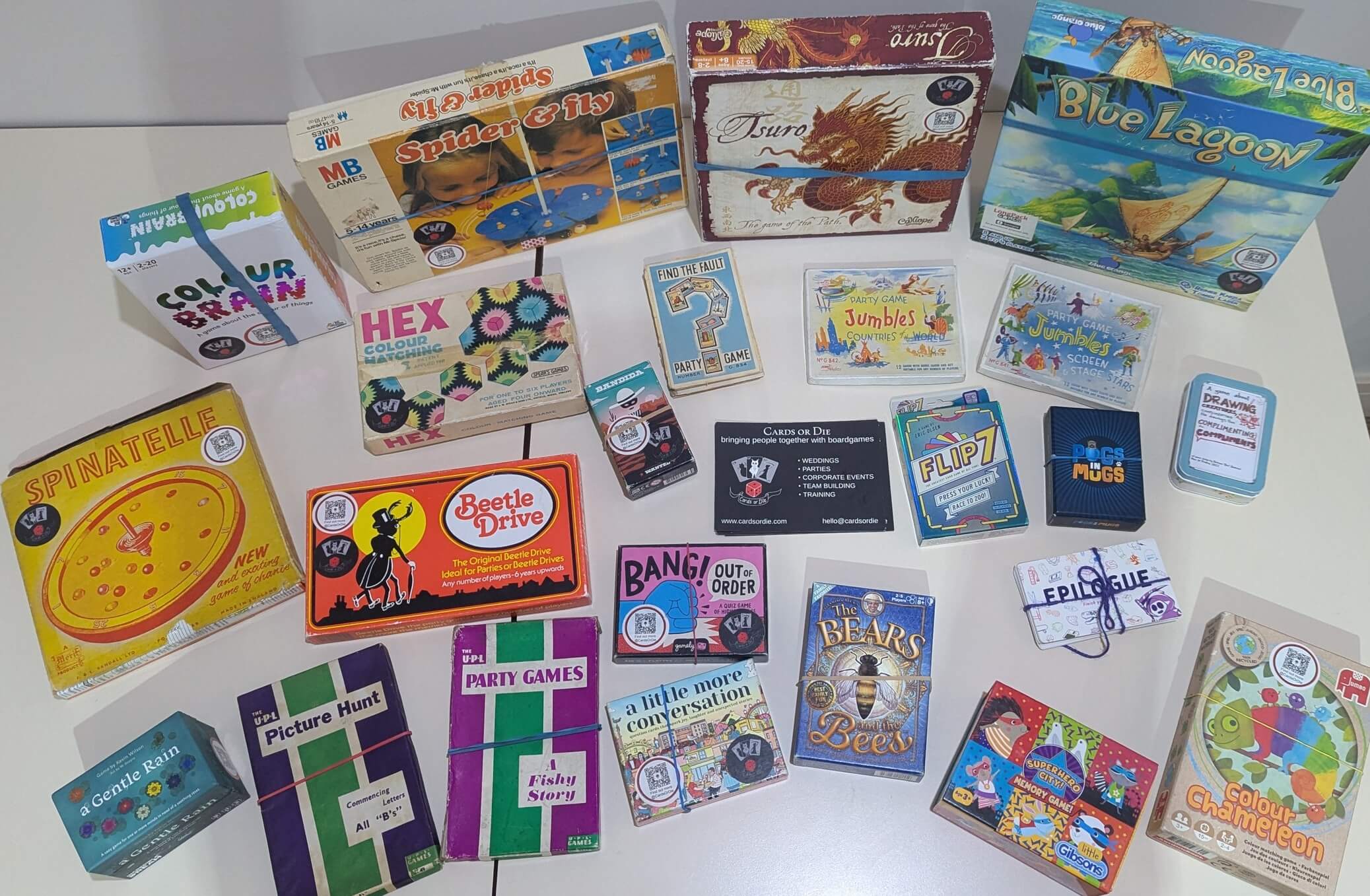
I recently ran an afternoon of board games at Truly Scrummy in Horsforth. It was part of a series of events they’ve put on to bring together new parents. It was designed to give you a chance to regain a little bit of your sense of self and to make some time for you and your little one!
These are the games I chose. I went for games that would give your brain just a gentle stretch; that pair well with holding a baby whilst playing and probably not having had enough sleep. We wanted to create a space that would enable you to connect with other grown ups over a fun game and enjoy some hot food and a coffee.
If you’re looking for games that fit this brief, then this is for you.
Quiz Games
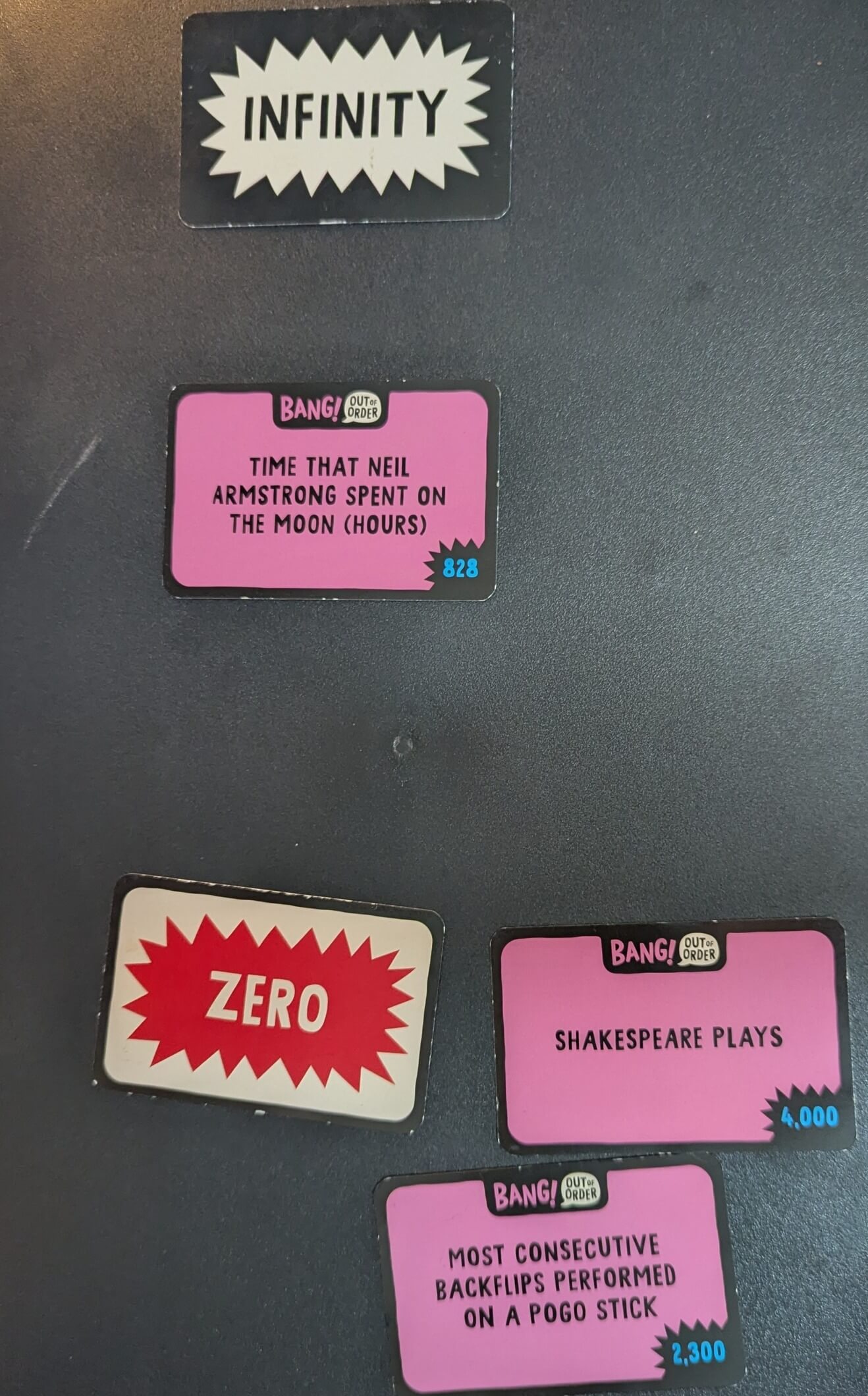
I enjoy quiz games but if I don’t know any answers for too many rounds, I quickly lose interest. Both Bang Out Of Order (Gamely Games) and Colour Brain (Big Potato) allow you to make educated guesses if you don’t know the exact answers. In Colour Brain you have a hand of cards, each card is a different colour. Someone asks the question and you play the card that is the answer. e.g. What colour is the lid on a jar of marmite?
In Bang Out of Order you are placing cards in the correct space on a line from zero to infinity. E.g. The card you have down is “time that Neil Armstrong spent on the moon (in hours)”. You draw a card and have to decide whether the number of “Shakespeare Plays” is higher or lower than the hours Armstrong spent on the moon. Subsequent cards e.g. “Most consecutive back flips performed on a pogo stick” (spoiler it’s higher than 1) must be slotted in higher, lower or in between the cards that are down. Shout ‘Bang out of order’ if you think they are not in the correct order. (I prefer to do this in what I believe is Phil Mitchell’s voice). If your challenge is correct, you win the cards. If you are wrong, the last player to place a card wins them. First to 15 cards wins.
The questions are always interesting and are guaranteed to get people chatting.
The numbers you can see on the cards are the answers to the statement on the flipside. Answers to these are at the bottom of the blog.
Vintage Games
These games hark back to a simpler time. When rolling dice was thrilling and moving a car round a map of Britain was ‘educative’. Hex is a colour matching game where you are trying to complete the most flowers (not unlike A Gentle Rain – a solo or co-operative game you can see on the table). It comes with it’s own score board so you don’t even need pen and paper for this one. There is no planning ahead, simply flip a tile and place it.
Jumbles are from the 1950s and are jumbled up countries and famous people – the tricky (and interesting) part here is that while they may have been fairly easy then they aren’t anymore: some of those places don’t exist and you have to cast your mind way back into the black and white TV days to get the celebrities.
Find the Fault are my favourite of these – study the image and identify the fault. I really like the style of the images and again some understanding of wartime ships and uniforms is helpful for some of them. It often ends up being played together with people discussing the images in some detail. The church image in particular generated a lot of conversation about spires and flagpoles and which direction churches should face. (All of these are red herrings by the way). Scroll to the bottom for the answers.
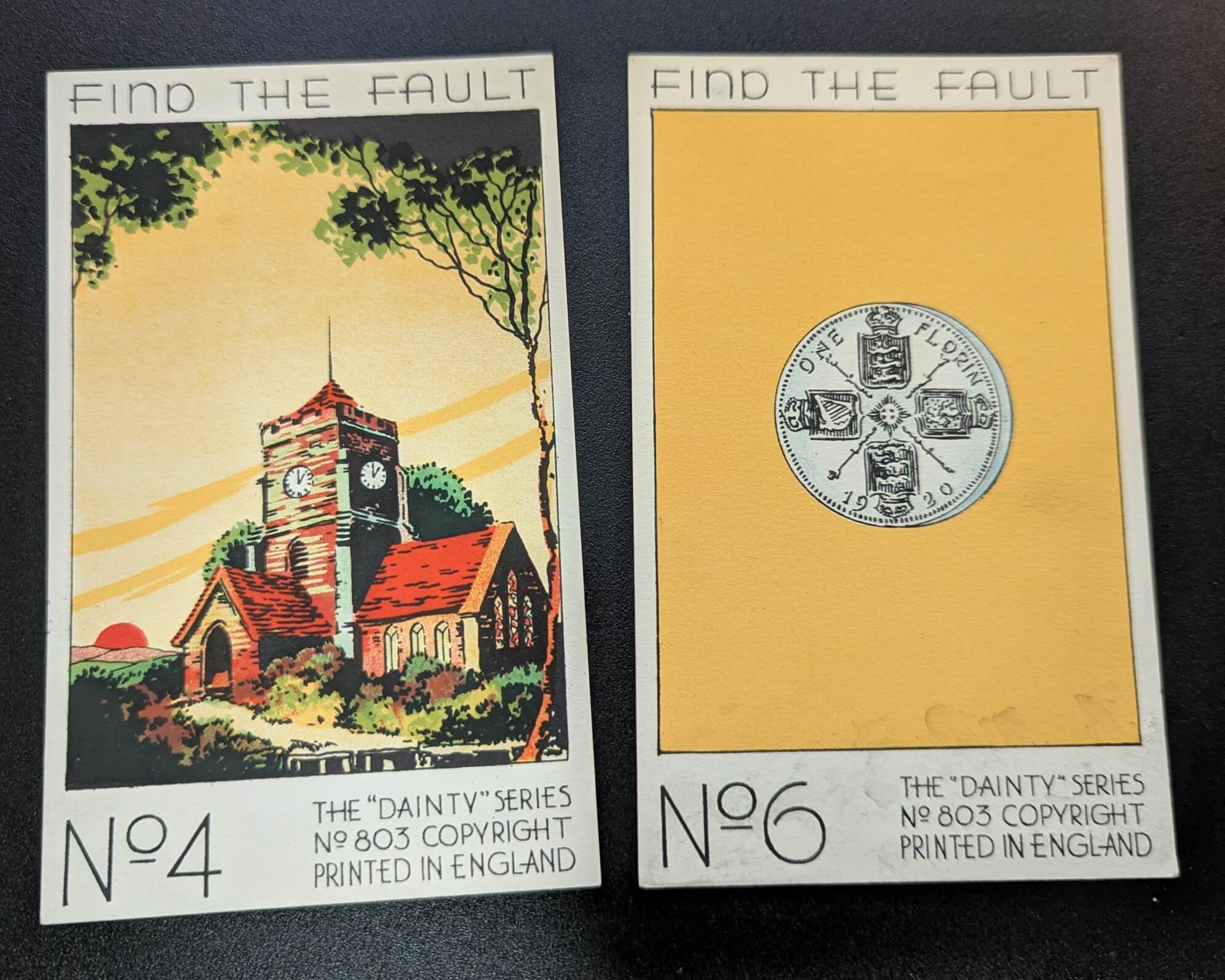
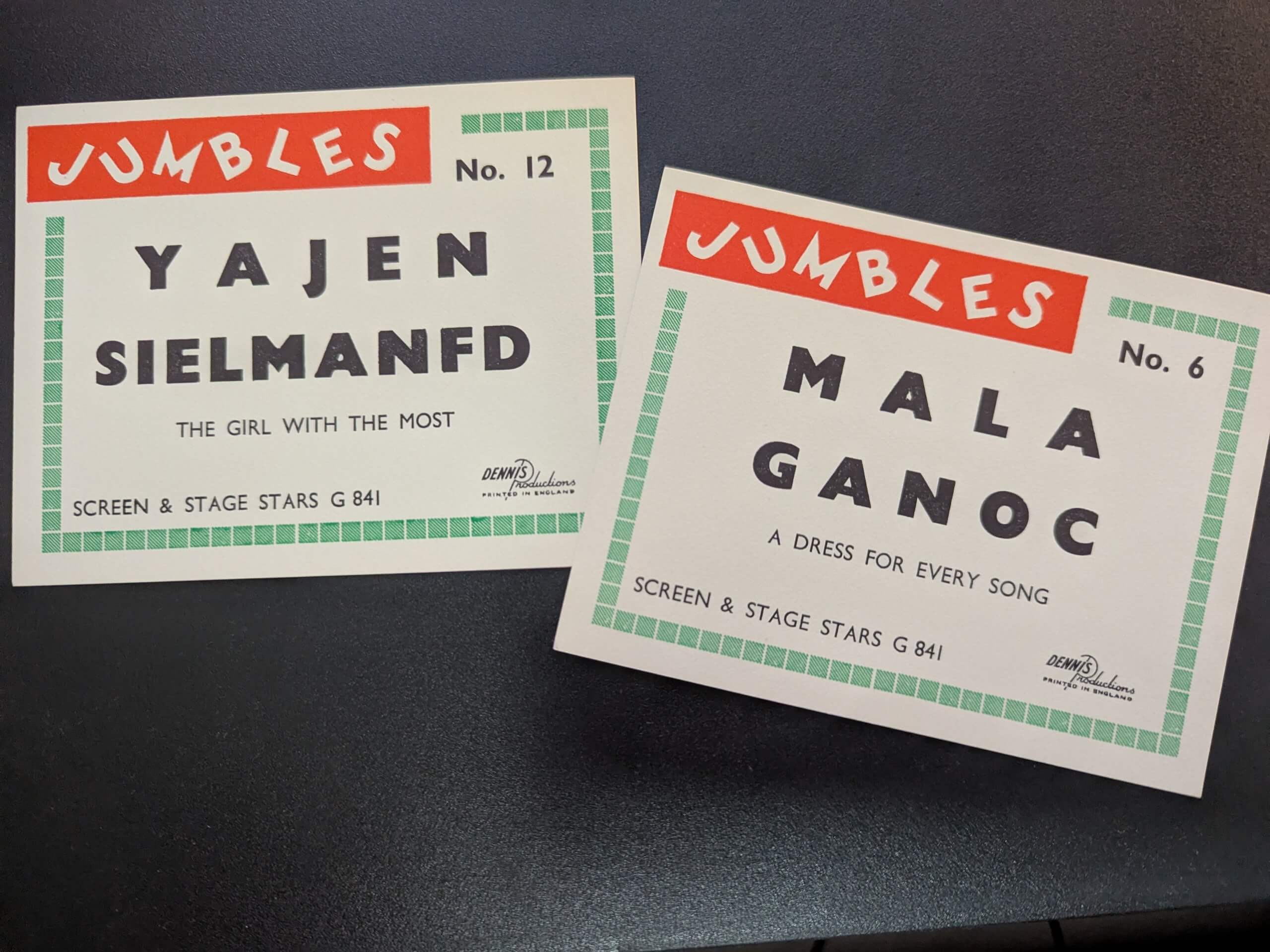
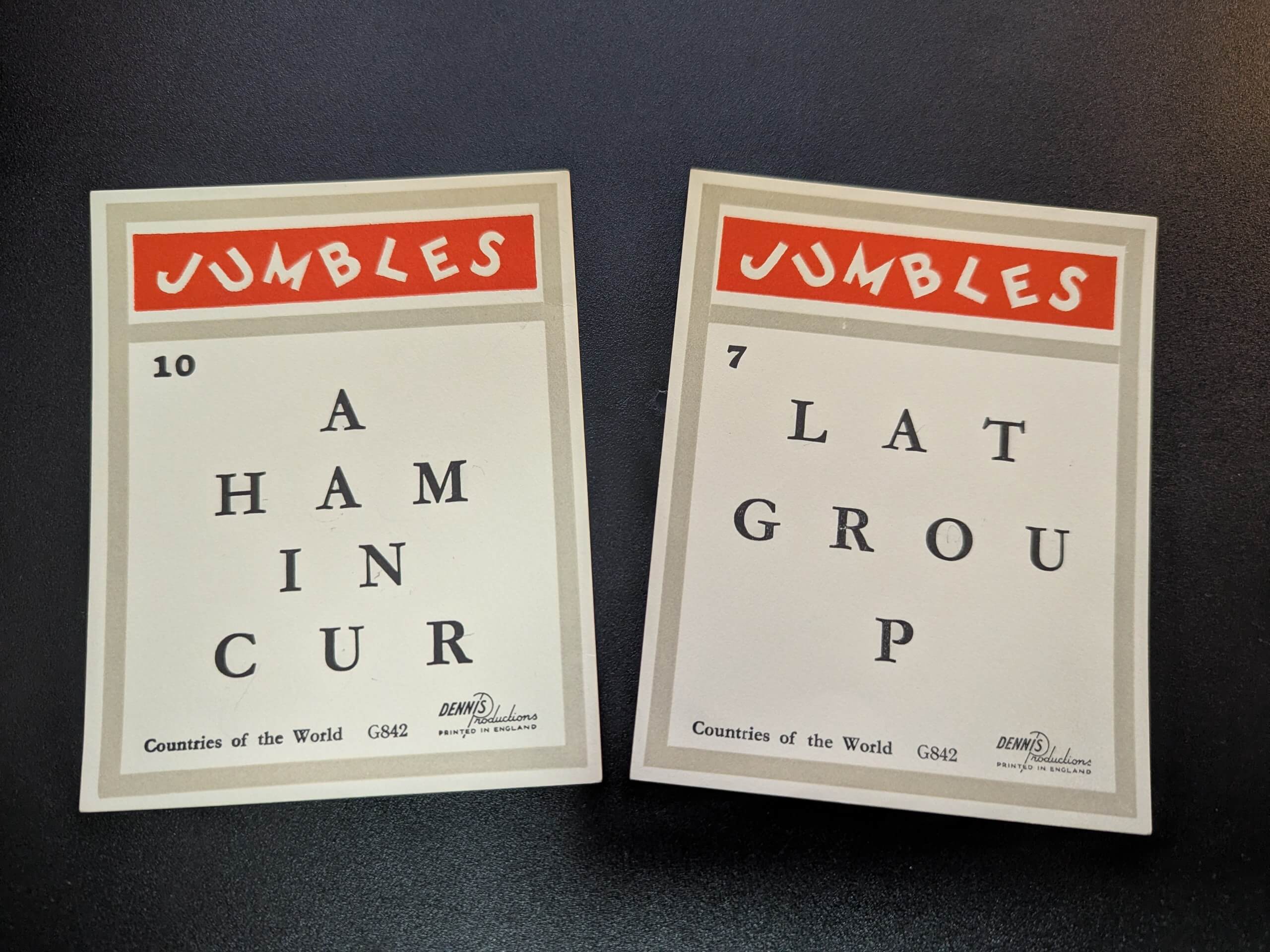
Mild strategy

Blue Lagoon is a great game for 3 or 4 players. It says 2 on the box but it doesn’t really work with 2. The game is played over two phases- first, you are exploring. You take turns to place a counter or a village on the board. You can start from any sea space but subsequent counters need to be placed by one of your existing counters. As you snake across the board you invariably get in others way and steal land that your opponents had their eye on. (Which is why it doesn’t work with two players – you can too easily avoid each other, sharing the world amicably between you.)
In the second half you can start from a sea space or next to any of the villages you have played and subsequent counters are placed next to existing ones – including villages. This changes the game significantly. If you have carefully spaced your villages you can maximise resources, quickly claim majority or link islands.
You gain points for being on the most islands, for having the majority on islands (the larger the island – the more you score), for connecting islands and collecting resources and statues. It’s not an uncommon theme – but it’s not the greatest – it doesn’t take too much to see colonialism lurking in the description above. However, the theme isn’t strong enough to impact the game – you are simply playing for area control and taking significant pieces. It provides a nice amount of strategy and as with the best of games, you can play again and test out different strategies. The pieces are nice and chunky and the people can pleasingly be placed at work or flipped over to be in a boat in the sea. There’s also the added bonus that if you forget whose turn it is you can just count everyone’s counters!
Push your luck – Flip 7

Flip 7 is a recent addition to the games menu for Cards or Die and it is getting played by everyone! A twist on Blackjack/ pontoon/ 21 – whatever you call it in your house – you start by being given one card then you choose to stick and bank your score or flip another card and increase your score or potentially go bust by drawing a number you already have. Played over a number of rounds, the winner needs to score 200 points. Cards are played face up so it’s as fun to watch other people’s turns as it is to have yours. There are also special cards which let you have a second chance, freeze a player or pick three cards in a row. Any of these cards can be played on another player or you may choose to play them on yourself. The number on the card also tells you how many of that card are in the deck – for instance there are twelve 12s – three 3s. You can use this to calculate your odds.
It’s extremely quick to pick up and learn and at it’s heart is a game of luck. Consequently if you can’t be bothered calculating the odds, you can still win! You don’t have to agonise about whether to play the freeze card on someone who already has 60 points or keep it stopping yourself from going bust – in which case you would of course spend subsequent deals encouraging them to flip a card…
It’s a really fun, engaging game that you can easily pause or cut short and I have not had anyone play it and not enjoy it!
Drawing Games
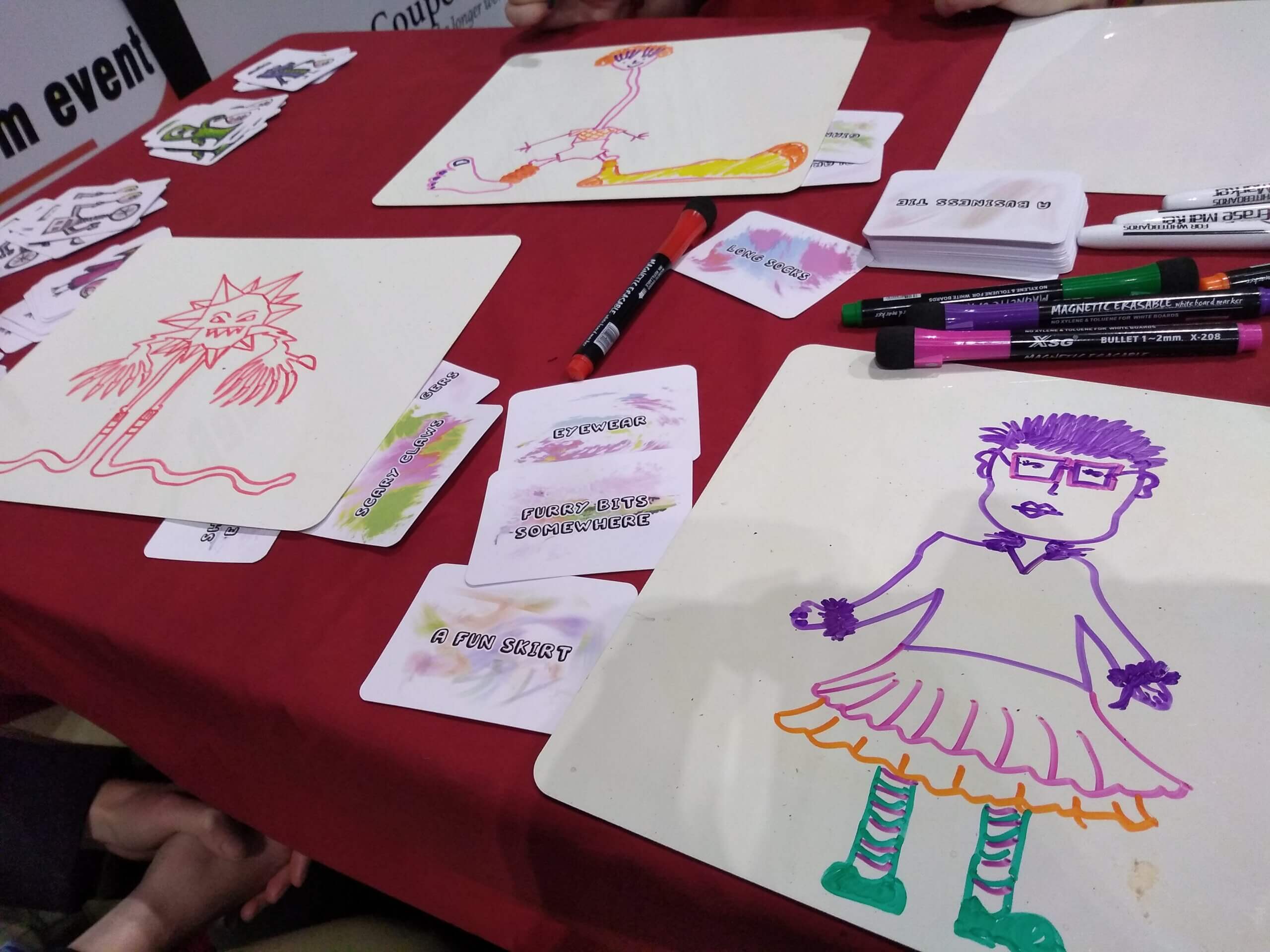
Beetle is just a game of rolling dice and trying to be first to roll one of each number and draw your beetle. Each part of the beetle is assigned a number. It really has no business being as much fun as it is. It’s easy and good fun and is another vintage classic. It’s surprising how competitive you can get about drawing.
By contrast A Game About Drawing Creatures and Complimenting the Drawings then Complimenting the Compliments couldn’t be less competitive. Place 1 communal ‘creature feature’ card in the middle and give 3 cards to each player. Everyone draws a creature with four ‘creature features’, resulting in some very imaginative and unusual creatures. Next you go around the table giving a compliment about each person’s drawing. There are even prompts on the back of the cards to give you ideas of how to give and receive compliments. Finally, each artist has to choose their favourite compliment that was given to them and say why it was a good compliment. Thus complimenting the compliments and completing the loop. It’s such a feel good game. Designed by Bez. This is the only place that seems to have it in stock.
In both of these games, drawing helps us be more mindful even if it’s just for a few minutes and as a new parent those opportunities can feel few and far between. I think these two are especially good if you have older children who will join in with the games too.
Story telling games
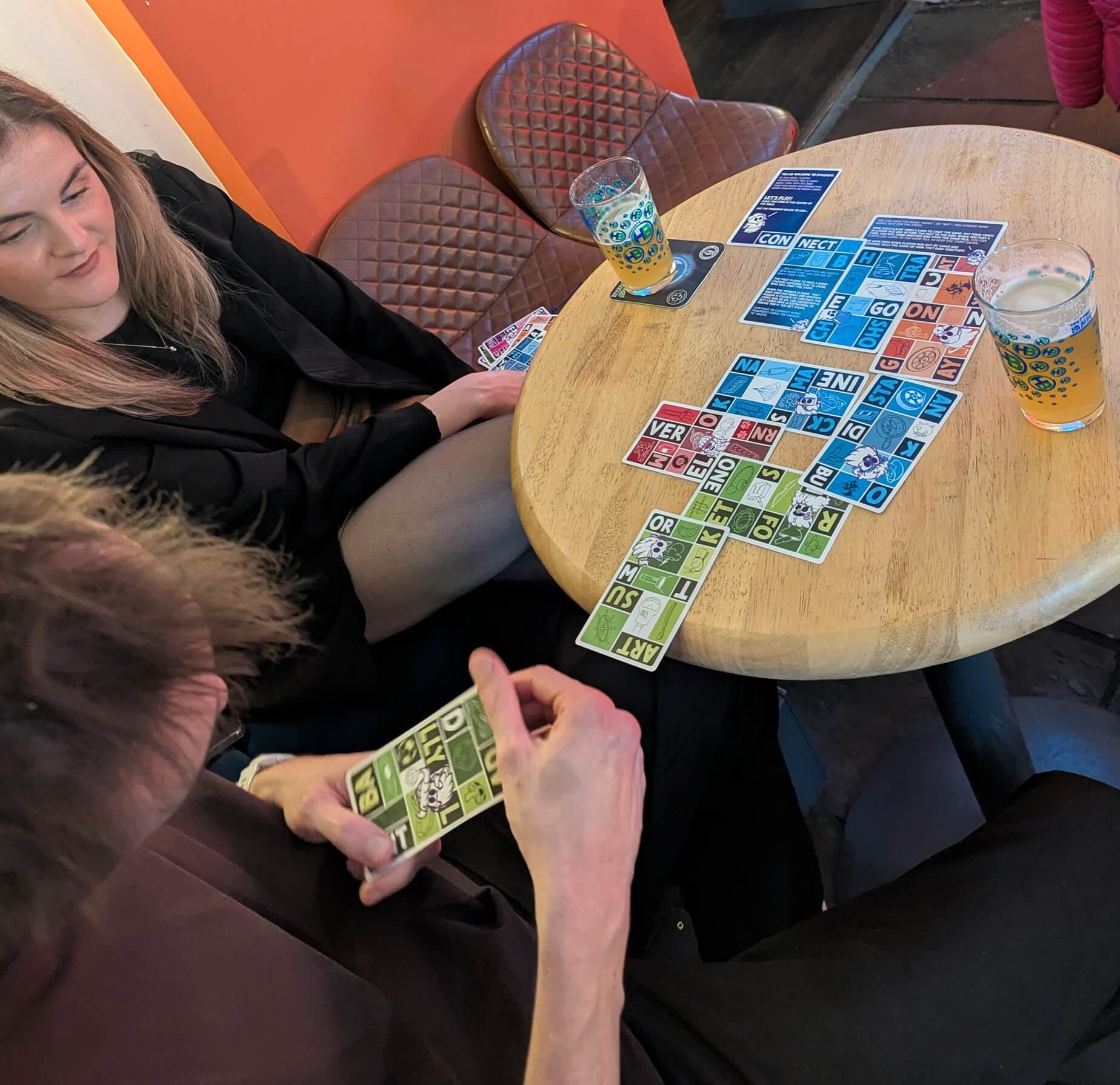
When you’re tired sometimes conversation can be a challenge. Epilogue invites you to go on a story telling journey that’s as whimsical as you want it to be. You are piecing together words from the fragments on the cards: make a word then point to someone who will tell the next part of the story including that word. You can make the story as long or short as you feel like by choosing the number of cards you play with. At the end of the story you will have uncovered and retold the details of your untimely demise!
‘A little more conversation’ encourages us to tell our own stories – sometimes reminiscing, sometimes looking ahead. It touches on all sorts of topics – silly things and serious. There is a choice of prompt on each card so you can avoid any difficult conversations that you are not in the mood to have. Lots of different people have played with these prompts – of course playing with someone you don’t know you can learn a lot of things about them and share lots too. But, because the questions are so wide ranging and some are unusual, it is also perfect to play with people we’ve known a long time. Even if you share memories it is always interesting to compare how differently we can remember something – whether it’s a funny moment you missed or forgot or just a fresh perspective it’s always interesting. Perfect for if you are fed up of only talking about whether baby did a poo or not and what consistency it was but your tired brain is refusing to offer up any other conversation starters!
I hope you’ve found some inspiration. Perhaps this reminds you of games you already have in the cupboard that might be perfect for those evenings or afternoons when you do suddenly find you’ve got headspace to play a game. Or perhaps there’s some ideas for your Christmas list. You are always welcome to come along to my events – I can find you a good game to play whether you’ve finagled a night out on your own or you’ve got the baby with you. Check out my website, facebook or instagram for upcoming events.
Colour Brain: a. The lid is Yellow. Jumbles – Screen and Stage: 6. Alma Cogan 12. Jayne Mansfield Jumbles Countries of the World: 10. Manchuria 7. Portugal Find the Fault: 4. Sunset at the wrong hour 6. No milling on the edge of the coin Bang Out Of Order: Neil Armstrong 21.5 hours, Backflips 22, Shakespeare plays 38.

Ann Jones set up Cards or Die board gaming in 2017 to bring people together with board games. Ann is Autistic, and as well as being passionate about board games she is dedicated to creating inclusive events.
You can book her to teach and recommend games at your event; whether that’s a wedding, corporate event, pub games night or a community group. Or, you can come along to one of her many free events and play games.
Come along to an event and find out more or get in touch to arrange a chat.
